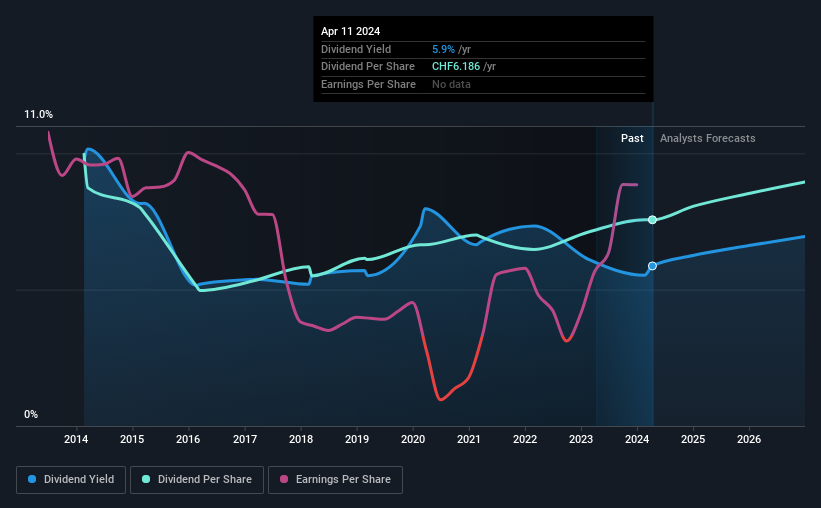
Some investors rely on dividends for growing their wealth, and if you're one of those dividend sleuths, you might be intrigued to know that Swiss Re AG (VTX:SREN) is about to go ex-dividend in just three days. The ex-dividend date is usually set to be one business day before the record date which is the cut-off date on which you must be present on the company's books as a shareholder in order to receive the dividend. The ex-dividend date is an important date to be aware of as any purchase of the stock made on or after this date might mean a late settlement that doesn't show on the record date. In other words, investors can purchase Swiss Re's shares before the 16th of April in order to be eligible for the dividend, which will be paid on the 18th of April.
The company's next dividend payment will be US$6.80 per share, and in the last 12 months, the company paid a total of US$6.80 per share. Last year's total dividend payments show that Swiss Re has a trailing yield of 5.9% on the current share price of CHF0105.40. If you buy this business for its dividend, you should have an idea of whether Swiss Re's dividend is reliable and sustainable. So we need to check whether the dividend payments are covered, and if earnings are growing.
See our latest analysis for Swiss Re
Dividends are usually paid out of company profits, so if a company pays out more than it earned then its dividend is usually at greater risk of being cut. Swiss Re paid out 61% of its earnings to investors last year, a normal payout level for most businesses.
Companies that pay out less in dividends than they earn in profits generally have more sustainable dividends. The lower the payout ratio, the more wiggle room the business has before it could be forced to cut the dividend.
Click here to see the company's payout ratio, plus analyst estimates of its future dividends.

Have Earnings And Dividends Been Growing?
Companies with consistently growing earnings per share generally make the best dividend stocks, as they usually find it easier to grow dividends per share. If earnings fall far enough, the company could be forced to cut its dividend. That's why it's comforting to see Swiss Re's earnings have been skyrocketing, up 52% per annum for the past five years.
Another key way to measure a company's dividend prospects is by measuring its historical rate of dividend growth. Swiss Re has seen its dividend decline 2.7% per annum on average over the past 10 years, which is not great to see. It's unusual to see earnings per share increasing at the same time as dividends per share have been in decline. We'd hope it's because the company is reinvesting heavily in its business, but it could also suggest business is lumpy.
To Sum It Up
Is Swiss Re an attractive dividend stock, or better left on the shelf? Swiss Re has an acceptable payout ratio and its earnings per share have been improving at a decent rate. We think this is a pretty attractive combination, and would be interested in investigating Swiss Re more closely.
So while Swiss Re looks good from a dividend perspective, it's always worthwhile being up to date with the risks involved in this stock. Our analysis shows 1 warning sign for Swiss Re and you should be aware of it before buying any shares.
If you're in the market for strong dividend payers, we recommend checking our selection of top dividend stocks.
New: Manage All Your Stock Portfolios in One Place
We've created the ultimate portfolio companion for stock investors, and it's free.
• Connect an unlimited number of Portfolios and see your total in one currency
• Be alerted to new Warning Signs or Risks via email or mobile
• Track the Fair Value of your stocks
Have feedback on this article? Concerned about the content? Get in touch with us directly. Alternatively, email editorial-team (at) simplywallst.com.
This article by Simply Wall St is general in nature. We provide commentary based on historical data and analyst forecasts only using an unbiased methodology and our articles are not intended to be financial advice. It does not constitute a recommendation to buy or sell any stock, and does not take account of your objectives, or your financial situation. We aim to bring you long-term focused analysis driven by fundamental data. Note that our analysis may not factor in the latest price-sensitive company announcements or qualitative material. Simply Wall St has no position in any stocks mentioned.
About SWX:SREN
Swiss Re
Provides wholesale reinsurance, insurance, other insurance-based forms of risk transfer, and other insurance-related services worldwide.
Excellent balance sheet, good value and pays a dividend.
Similar Companies
Market Insights
Community Narratives




